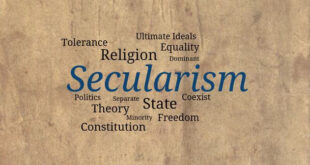The Awakened Mind vs the Hacked Mind
Ms. Mohga Mashhour*,
Dr. Sherif Abdul-Rahman**
Islamic societies are witnessing an expansion of a phenomenon that can be called “Civilizational Normalization”. This refers to a nonstop sneaking of ideas and perspectives that contradict the Islamic identity, targeting the hearts and minds of Muslim youths. The big problem is that, by their ongoing sneaking, those ideas and perspectives become basic components in the collective mind of the society, so we can find individuals strongly defend and spread them as if they are originated from their own vision, culture and identity.
This phenomenon raises the question about how much the cultural identity of Muslim societies is stable. Identity, as known, is a combination of cultural and dogmatic pillars which represent the original character of the nation, formulate its common features, inspire its deeds and actions and represent the axis of its psychological and mental stability. As an expression of the core of the mutual historical and cultural convictions and experiences of the nation, identity is supposed to be relatively constant. In the Muslim nation, this constancy is supposed to be well established and deep-rooted, because the identity sources in Muslim society are derived from the knowledge of (Divine) Revelation supported by authenticated texts in the fields of decree, Shariah (Legislation) and morals.
But the deviation of Muslim nation away from its identity, and the civilizational disintegration it is facing, which is echoed by the actions of its youths in supporting visions and perspectives contradicting Islamic fundamentals, shed light on the stiffness of the cultural and civilizational attack that leads to the “cultural normalization”.
Identities are in a constant conflict, and civilizations representing these identities are in a continuous competition to impose their own moral and cultural systems. When the confrontation occurs between a Revelation-oriented identity and a man-made one, which neglects the Divine principles and fundamentals, the conflict and competition become deeper and stronger. This appears during the current civilizational moment regarding the nature of the relation between the western and the Muslim world. This is echoed through the surrender of wide categories of Muslim youths to the western civilization, which aims to eliminate their particularity, manipulate their minds to accept what opposes their backgrounds and beliefs and make them mere blind followers; achieving all kinds of dogmatic, moral and valuable concessions for the sake of this fellowship.
The challenge of this current civilizational moment is aroused because the superior west relentlessly spare no efforts in eliminating his rival’s identities by using all tools and means, the direct and indirect one, the violent and gentle, the hostile and peaceful. Despite of the difficulty of facing such sweeping civilizational aggression, its success in achieving its objectives depends on the level of submission of the attacked party and his acceptance of the other’s frame of reference. In another words, the success and failure of the western civilization model in invading the Muslim world rely on the level of awareness and vigilance of the Muslim societies. This sparks a glimmer of hope that it is possible to twist the strength equation in the favor of the party which has stronger roots of identity and culture and, accordingly, is able to stop the cultural normalization process or at least limiting its impacts.
Modernity between the West and the Arab and Muslim Societies
We can date the emergence of the phenomenon of western beliefs spreading across Muslim societies back to the beginning of the stage of contacting with the western modernity which reached its peak at the era of colonialism expansion. The materialistic development of the western countries and their success in occupying Muslim countries persuaded the latter to accept the system of “the superior party” regarding its value vision, intellect and civilization.
This acceptance was preceded, naturally, by the spread of certain tendencies. In fact, Muslim societies, during this period, were in a state of civilizational stagnation and materialistic degradation. Thus, their admiration for the other is a spontaneous inevitable reaction. On the other hand, the west made great strides in applying his modernity on social, cultural and political achievements, as the ideas of his scholars and thinkers found their way in changing the real world.
In the other hand, the Muslim world reflects a totally different situation, as the current social and cultural arena failed to react with the dogmatic and cultural system. While Shariah has been stimulating the Muslim to travel through the earth and construct it and search for an answer to the existential question: “How life on earth has begun?”, Muslim academic societies were busy in studying Mutoon (scholarly texts), commentaries and detailed studies which do not achieve any earth construction or self-purification. This caused a gap between Muslims and their real world, and Muslims and their frame of reference. Therefore, huge sects of Muslim societies, under the charm of the western modernity which achieved a harmony between its ideas and its reality, were pushed to adopt its cognitive models and use it as a reference in its way towards progress and renaissance.
Accordingly, answering to the “renaissance dilemma” in both the eighteenth and the nineteenth century was limited to just one choice: imitating the experience of the western modernity and keep trying to preserve the nation’s character regarding the creed and value vision. Yet, this choice, during this particular early period, leads to the impossibility of fulfilling the condition of character protection. Transferring the experience of the western modernity hindered Muslim nation from developing its own modernity and renaissance. In other words, it prevented it from having the chance of developing a modernity which respects the Islamic context and principles, maintains the Islamic fundamentals and flies with the Muslim societies to the horizons of urbanism without sacrificing human. A modernity which reforms research methodologies and thinking mechanisms and reacts effectively with the social and cultural environment of these societies.
Now, long decades after Muslim reformers answered the renaissance dilemma, it is certain that they did not find the correct answer, and that they failed in transferring the moment of civilizational contact with the other to be a moment of awakeness for the Muslim mind. They were not aware enough to the fact that it is impossible for this nation to realize a comprehensive cultural renaissance depending on achievements from a strange world or following external ideas. In fact, Muslims have fell into the trap which catches every weak and inferior. They have imitated the strong victorious in “his clothing, transportation means, weapon and all his lifestyle…”, as observed by Ibn Khaldoun, but the western modernity sneaked through them with its diseases. Here a new status of division appears between those who regard modernity as a cultural invasion representing an extension of the western colonialism, and those who believe it to be a process of enlightenment which is inevitably a guidance for every contemporary Muslim. And soon some members of the latter group declared their denial of the Islamic reference and related all the forms of failure in the Muslim countries to this reference. This group also invites all those who are seeking progress to abandon their cultural specificity and join the world of enlightenment where the west is the center and the standard and the other is the margin and the irregular.
This westernized discourse turns to adopt or even believe in a set of fundamental concepts of modernity like secularism, evolution, freedom, materialism and rationalism, and exerts efforts in spreading (normalizing) them amongst Muslim societies through media channels and various artistic forms. Therefore, we are facing a collective mind believing in a number of views and ideas that explicitly and shockingly contradict the Islamic identity. We can check the validity of this conclusion by analyzing two principle concepts: Progress and Freedom.
Progress, Materialism and Consumption
After modernity achieved its economic growth and raised the work and the profit as the center of the so called “industrial revolution”, the idea of “the economic man” was spread across the world to grasp the attention of the consumer needed for the huge production operation. In fact, the consumerist materialistic progress becomes the only accepted code for achieving progress. Accordingly, the underdeveloped countries were obliged to be an open market for the factories’ productions of western countries. In fact, underdeveloped countries have started to adopt this view regarding progress and have been keen on bridging the gap between them and the industrial countries by adopting patterns in the field of consumption and urbanism similar to that spreading in the west. The image of the luxurious consumerist society (like in the capitalist countries) becomes the model which the underdeveloped countries are eager to achieve believing it to be an image of progress and civilizational distinction.
For individuals, the only permissible ambition is the ambition of consumption and reaching the highest materialistic levels. Accordingly, goods gained a pivotal value in the life of man to the extent that it exceeds its real economic value. In fact, good acquisition, in itself, has gained a social dimension which each individual is eager to reach. This is due to the (supposed) direct proportion between the individual status and the quantity and quality of his consumer goods.
This leads to the spread of brands phenomenon which the consumer longs for despite the rise of their price, to assure his belonging to the rich and upper classes. The invasion of this phenomenon spreads in the society till reaching the religious classes themselves. For example, the “hijab” which is supposed to reflect the values of humbleness, simplicity and modesty, has turned to be a garment of pride and vanity; holding the slogans of international fashion houses.
Muslim societies filling in the trap of the consumer materialistic vision is not implicit anymore, as market values sneaked into the value structure of those societies. Thus, the individual is encouraged to prefer the innate tendency towards materialistic and consumption over the dimensions of value vision and spiritual and humanitarian aspects. The pursuit of happiness and promotion for the collective mind became connected directly to the target of achieving the highest rate of earning, luxury and consumption, without any consideration to the negative consequences of such attitude and its contradiction with the core of the concepts of moderation, uprightness and solidarity which form the corner stones of the frame of the Islamic vision.
Freedom, Paraphilia and Homosexuality
Although the concept of freedom is among the principle religious and humanitarian concepts, the concept of the absolute freedom is not similar. Adding “absolute” to freedom is tricky, as it includes factors that can divide societies adopting its concept.
Yet, western civilization had adopted the absolute freedom in many contexts even those inadequate to follow freedom as a standard, such as matters relating to gender, natural configuration and human’s innate lust. Depending on a liberal vision which neglects all fundamentals, a principle movement in the west has emerged to support the right of being different and the right of the divergent, among which are those groups that contradict the natural configuration of the natural human being, known as the LGBT community.
Paraphilia is a known concept and a used term among the humanitarian societies as a description of the sexual affairs against human nature, religious orders and even social customs and traditions. Yet, under the slogan of absolute freedom, the west has witnessed a gradual transformation from the concept of “Paraphilia” into the concept of “homosexuality “.This has appeared since the year of 1967, when the laws were issued to protect these sorts of relationship without considering them as a form of paraphilia or a criminal act. Teaching lessons emphasizing this message have started to be legal and pedophile families have been allowed to adopt children. In fact, the normalization of those ideas does not target the west alone. Yet, the west has started to export its perspectives to the others. Thus, in a few years, the pressure of the groups supporting the gay rights increased until “their case” reached UN halls and the ongoing efforts were intensified to issue international charters obligating countries worldwide to expel this category from the circle of psychological disorder or legal punishment and regarding them as normal persons; receiving all kinds of respect and enjoying all human rights. This has been developed to the extent that condemning their action or disapproving their dare in promoting their inclination inside societies is enough to face a legal punishment for discrimination and human rights violation.
Muslim countries are facing huge international pressure to be obliged to accept and apply the international charters and laws supporting this category. Those imposed pressures can be faced by awareness and self-immunity. But the real danger appears when some “enlightened” members inside Muslim societies adopt such calls and promote a positive image about those gays via TV shows and articles (as successful members in the society and distinctive humanitarian models). This has been taking an increasing way aiming to totally vanish the influence of the previous overview about these categories in the artistic and literary works which describe them as sociably rejected or persons with behavior disorder.
Normalizing such ideas has been intensified. In addition, the steps needed for reformatting the collective mind towards adopting such perspectives and others, despite its contradiction with legislation and religion and its conflict with the social traditions, are gaining a new ground every day. Thus, it is necessary to establish a counter consciousness to protect our societies against all the inputs which contradict its dogmatic and moral background.
To reformat the awakened mind, it is necessary to develop an alternative civilizational model depending on personal and historical identity of the nation to embrace its sources (Revelation which inspires its vision and provides it with values and standards) and its knowledge (the mutual historical experiments which unite its individuals under one culture). At the same time, it should face the status of lacked/ hacked awareness or the civilizational normalization demolishing its background, obliterating its identity and margining its religious and civilizational sources and fundamentals.
Translated by: Rehab Jamal Bakri***
ــــــــــــــــــــــــــــــــــــــــــــــــــ
* Director of the Khotwa Center for Documentation and Studies, and Secretary edit of the contemporary Muslim magazine.
** Lecturer at the Faculty of Economics and Political Science, Cairo University.
*** Egyptian Researcher and Translator.
 مركز خُطوة للتوثيق والدراسات Khotwa Center for Documentation& Studies
مركز خُطوة للتوثيق والدراسات Khotwa Center for Documentation& Studies




